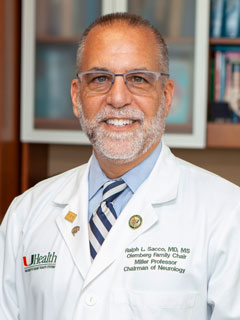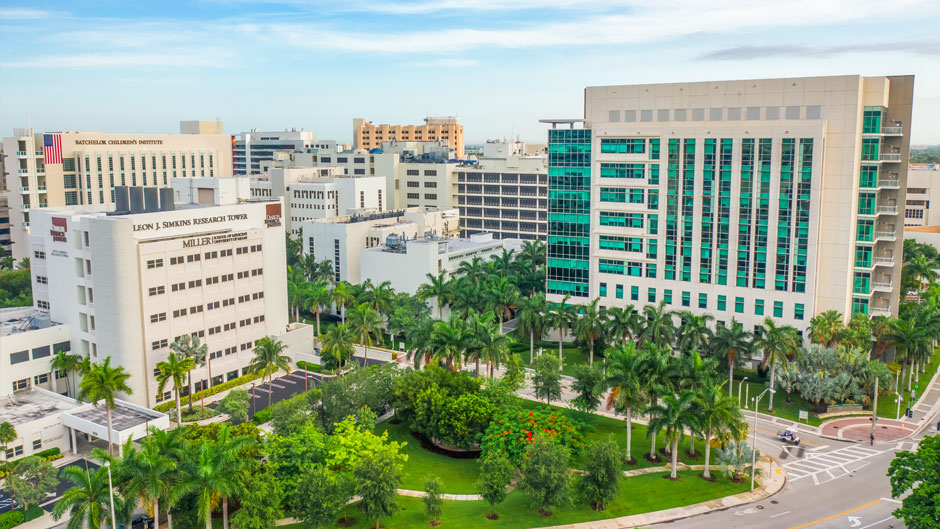The University of Miami’s Miller School of Medicine is one of a few medical schools across the nation selected by the National Institutes of Health to test the effectiveness of treating COVID-19 patients with convalescent plasma.
Plasma is the yellow liquid in blood that contains antibodies. When a person contracts a virus such as COVID-19, their immune system creates antibodies to fight the virus. Convalescent plasma is the blood plasma collected from survivors of the novel coronavirus disease.
Although thousands of COVID-19 patients across the country have already been treated with convalescent plasma—and the U.S. Food and Drug Administration on Sunday gave approval for its emergency use in hospitalized coronavirus patients—there still has not been enough data from clinical trials to decisively prove how helpful donated plasma is to combat COVID-19, health officials contend. The randomized, controlled trial aims to offer that evidence.

“Many clinicians have made anecdotal observations of the benefits of convalescent plasma on hospitalized patients with COVID-19 infection; however, this needs to be validated by a well-designed, randomized clinical trial,” said Dr. Dushyantha Jayaweera, associate director of the Miami Clinical and Translational Science Institute (CTSI), a professor of medicine in the Division of Infectious Diseases and the trial’s principal investigator, along with a team of co-investigators. “This study brings together collaborators at UM and from around the country to provide an answer if this is indeed an effective treatment for COVID-19.”
According to Dr. Ralph Sacco, director of the CTSI and an investigator on the study team, if the plasma is effective, doctors will have at least two evidence-based strategies to know they are helping patients suffering from COVID-19—the drug remdesivir, which helps COVID-19 patients with inflammation, and convalescent plasma.
“This trial could provide the conclusive data to prove efficacy of the treatment,” said Sacco, who is also chair of the Miller School’s Department of Neurology. “It could be a lifesaver.”
The study team is hoping to recruit close to 400 adults who test positive for COVID-19 for the trial. Participants must be recently hospitalized either at UHealth Tower or Jackson Memorial Hospital, but they cannot be in the intensive care unit or on a ventilator. As part of the trial, these patients will either receive the convalescent plasma or a placebo.
“The hope is, this will help people early in the course of the disease,” Sacco added. “As COVID-19 gets more severe, it is harder to change the outcomes. So, we want to recruit patients as early as possible, prevent the deterioration of their condition, and accelerate improvement.”
Specifically, the study aims to determine whether convalescent plasma can prevent the development of breathing symptoms or reduce their severity of these symptoms in people with COVID-19. This would help reduce the need for additional oxygen, mechanical ventilation, and admission to the intensive care unit.
The trial is funded by the National Center for Advancing Translational Sciences (NCATS), which is a center of the National Institutes of Health. Other medical schools collaborating in the trial include New York University’s Grossman School of Medicine, Albert Einstein College of Medicine, Yale University School of Medicine, and the University of Texas Health Science Center at Houston.

In April, the University of Miami began using convalescent plasma for treatment of seriously ill COVID-19 patients as part of the expanded access program led by the Mayo Clinic. However, the new NIH-funded clinical trial is different because it is a true experimental study. Therefore, only half of the participants will receive plasma, which will allow physicians to compare the treatment with a placebo.
Many health care professionals believe that convalescent plasma treatments may be successful in helping people to fight off a range of viruses, including COVID-19. Early findings from the convalescent plasma treatment programs that began shortly after the onset of COVID-19 show that the higher the concentration of antibodies contained in the donated plasma, the better the receiving patient fared in recovering, Sacco said. Furthermore, he added, early results from these studies of antibody rich COVID-19 plasma show that it is relatively safe to infuse convalescent plasma into a person suffering from COVID-19.
“We’re hopeful that the many years of theory on convalescent plasma will prove effective for COVID-19, but we need the Grade A evidence,” Sacco remarked.
In the coming weeks, a second clinical trial will be starting through the Miller School, to use convalescent plasma as a preventive measure in people who have been exposed to COVID-19 or who are mildly ill from the disease. Participation in this trial will be offered at UHealth outpatient clinics, and the study will be led by Dr. Shweta Anjan. Please contact covidplasmastudy@miami.edu for more information.
In addition, the CTSI will be leading a webinar Sept. 1 at 4 p.m., where researchers will discuss all of the convalescent plasma research happening at the Miller School. Those interested can register here.

